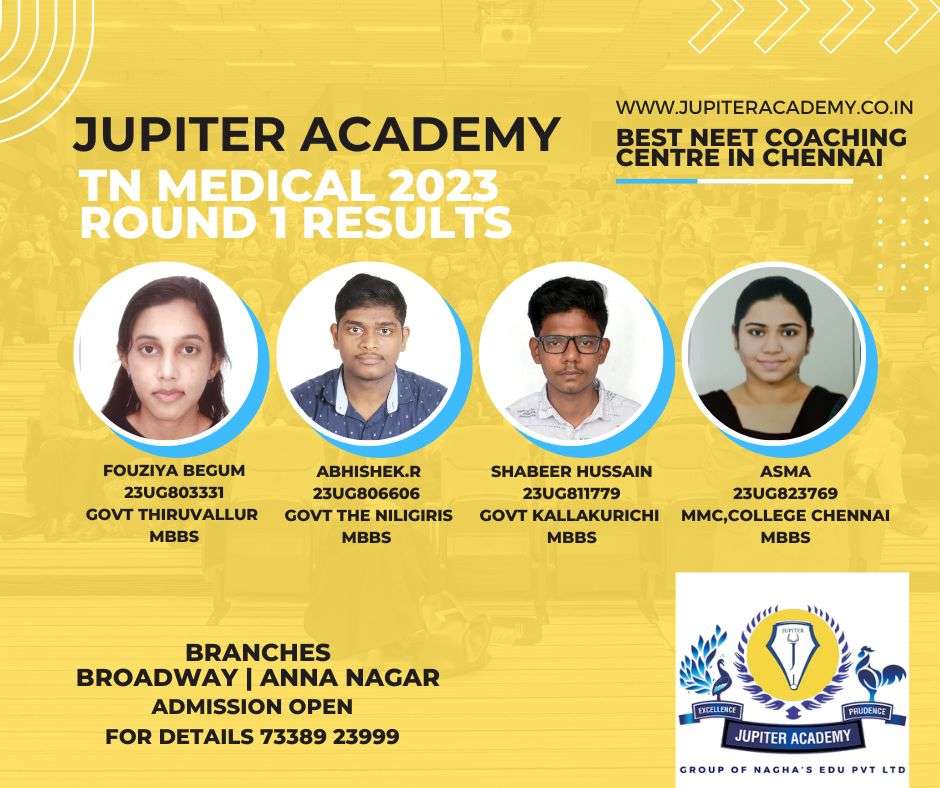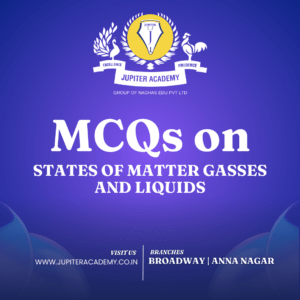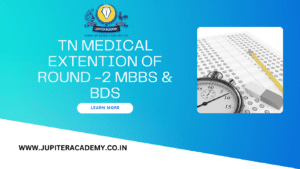Advisory and Instructions on Updation of Aadhaar Card/ UDID Card/...
Read MoreNEET MCQS STATES OF MATTER GASES AND LIQUIDS WITH ANSWERS

NEET MCQS STATES OF MATTER GASES AND LIQUIDS

What is Matter in Chemistry?
As discovered by scientists,
The matter is made up of very tiny particles and these particles are so small that we cannot see them with naked eyes.
It has been observed that matter exists in nature in different forms. Some substances are rigid and have a fixed shape like wood and stone; some substances can flow and take the shape of their container like water, while there are forms of matter that do not have definite shape or size such as air.
The states of matter, gases and liquids, are an important part of the NEET syllabus. Questions on these topics are likely to appear in the Physics and Chemistry sections of the exam.
Here are some of the important concepts related to the states of matter gases and liquids that you should know for the NEET exam:
- The kinetic theory of gases: This theory explains the behavior of gases by assuming that the particles of a gas are constantly moving and colliding with each other and the walls of the container.
- The ideal gas law: This law relates the pressure, volume, and temperature of an ideal gas.
- The real gas law: This law takes into account the interactions between the particles of a real gas.
- The properties of liquids: Liquids have a definite volume but no definite shape. They are denser than gases but less dense than solids.
- The intermolecular forces in liquids: These forces are responsible for the properties of liquids, such as surface tension and viscosity.
In addition to these concepts, you should also be familiar with the following:
- The phase diagram of a substance: This diagram shows the different phases of a substance at different temperatures and pressures.
- The colligative properties of solutions: These properties are those that are dependent on the number of solute particles in a solution, but not on the identity of the solute particles.
NEET MCQS STATES OF MATTER GASES AND LIQUIDS WITH ANSWERS
Sure, I can provide you with some multiple-choice questions (MCQs) related to the states of matter, specifically focusing on gases and liquids, along with their answers. Here are five questions:
1. **Question:** What is the primary factor that distinguishes a gas from a liquid?
a) Volume
b) Temperature
c) Density
d) Composition
**Answer:** a) Volume
2. **Question:** Which of the following is an example of a gas-liquid mixture?
a) Soda
b) Ice cream
c) Wood
d) Steel
**Answer:** a) Soda
3. **Question:** Which gas is the most abundant in Earth’s atmosphere?
a) Oxygen
b) Nitrogen
c) Carbon dioxide
d) Hydrogen
**Answer:** b) Nitrogen
4. **Question:** At which temperature do gases condense into liquids?
a) Absolute zero
b) Boiling point
c) Freezing point
d) Room temperature
**Answer:** b) Boiling point
5. **Question:** Which of the following is a physical property of liquids?
a) Ability to expand to fill any container
b) Definite shape
c) Incompressibility
d) Flowability
**Answer:** d) Flowability
JEE MCQS STATES OF MATTER GASES AND LIQUIDS WITH ANSWERS
Certainly, here are some multiple-choice questions (MCQs) on the topic of “States of Matter: Gases and Liquids” along with their answers:
**1. Which of the following statements about the kinetic molecular theory of gases is true?**
A. Gases have definite shape and volume.
B. Gases consist of tightly packed particles.
C. Gases are in constant motion and have no definite shape or volume.
D. Gases have a fixed arrangement of particles.
**Answer: C**. Gases are in constant motion and have no definite shape or volume.
**2. What happens to the pressure of a gas in a closed container if the temperature is increased while keeping the volume constant?**
A. Pressure increases.
B. Pressure decreases.
C. Pressure remains constant.
D. Pressure becomes zero.
**Answer: A**. Pressure increases.
**3. Which of the following gases is most soluble in water at a given temperature?**
A. Oxygen (O2)
B. Nitrogen (N2)
C. Carbon dioxide (CO2)
D. Helium (He)
**Answer: C**. Carbon dioxide (CO2)
**4. What is the boiling point of water at standard atmospheric pressure (1 atm or 101.3 kPa)?**
A. 0°C
B. 100°C
C. -273.15°C
D. 212°F
**Answer: B**. 100°C
**5. Which of the following substances is an example of a supercritical fluid?**
A. Liquid nitrogen (N2)
B. Solid carbon dioxide (dry ice)
C. Water vapor (steam)
D. Supercritical carbon dioxide (SCCO2)
**Answer: D**. Supercritical carbon dioxide (SCCO2)
**6. The process of a gas changing directly into a solid without passing through the liquid state is called what?**
A. Sublimation
B. Condensation
C. Evaporation
D. Deposition
**Answer: D**. Deposition
**7. Which gas is commonly used as a refrigerant due to its low boiling point and high heat absorption capacity?**
A. Oxygen (O2)
B. Hydrogen (H2)
C. Nitrogen (N2)
D. Chlorofluorocarbons (CFCs)
**Answer: D**. Chlorofluorocarbons (CFCs)
**8. What is the critical temperature of a gas?**
A. The temperature at which a gas turns into a liquid.
B. The highest temperature at which a gas can be liquefied, regardless of pressure.
C. The temperature at which a gas becomes supercritical.
D. The temperature at which a gas becomes a solid.
**Answer: B**. The highest temperature at which a gas can be liquefied, regardless of pressure.
**9. Boyle’s law relates the pressure and volume of a gas at constant _______________.**
A. Temperature
B. Mass
C. Density
D. Composition
**Answer: A**. Temperature
**10. Which of the following is a property of liquids that is not shared by gases?**
A. Definite shape
B. Definite volume
C. Compressibility
D. Expansibility
**Answer: B**. Definite volume
Here are some tips for answering questions on the states of matter gases and liquids in the NEET | JEE exam:
- Pay attention to the keywords in the question. This will help you to identify the concept that is being tested.
- Use the equations and concepts that you have learned to solve the problem.
- Be careful to avoid making careless mistakes.
- Practice answering questions on the states of matter gases and liquids from past NEET | JEE papers. This will help you to get a feel for the types of questions that are likely to be asked.
NEET 2025: OMR Sheet Filling Tips to Avoid Mistakes
NEET 2025: OMR Sheet Filling Tips to Avoid Mistakes Preparing...
Read MoreTN Medical 2024 Counseling: Extension of Round 2 for MBBS & BDS
TN Medical 2024 Counseling: Extension of Round 2 for MBBS...
Read MoreNEET MCQS STATES OF MATTER GASES AND LIQUIDS WITH ANSWERS NEET MCQS STATES OF MATTER GASES AND LIQUIDS WITH ANSWERS NEET MCQS STATES OF MATTER GASES AND LIQUIDS WITH ANSWERS NEET MCQS STATES OF MATTER GASES AND LIQUIDS WITH ANSWERS NEET MCQS STATES OF MATTER GASES AND LIQUIDS WITH ANSWERS NEET MCQS STATES OF MATTER GASES AND LIQUIDS WITH ANSWERS NEET MCQS STATES OF MATTER GASES AND LIQUIDS WITH ANSWERS NEET MCQS STATES OF MATTER GASES AND LIQUIDS WITH ANSWERS NEET MCQS STATES OF MATTER GASES AND LIQUIDS WITH ANSWERS NEET MCQS STATES OF MATTER GASES AND LIQUIDS WITH ANSWERS NEET MCQS STATES OF MATTER GASES AND LIQUIDS WITH ANSWERS
JEE MCQS STATES OF MATTER GASES AND LIQUIDS WITH ANSWERS JEE MCQS STATES OF MATTER GASES AND LIQUIDS WITH ANSWERS JEE MCQS STATES OF MATTER GASES AND LIQUIDS WITH ANSWERS JEE MCQS STATES OF MATTER GASES AND LIQUIDS WITH ANSWERS JEE MCQS STATES OF MATTER GASES AND LIQUIDS WITH ANSWERS JEE MCQS STATES OF MATTER GASES AND LIQUIDS WITH ANSWERS JEE MCQS STATES OF MATTER GASES AND LIQUIDS WITH ANSWERS JEE MCQS STATES OF MATTER GASES AND LIQUIDS WITH ANSWERS JEE MCQS STATES OF MATTER GASES AND LIQUIDS WITH ANSWERS JEE MCQS STATES OF MATTER GASES AND LIQUIDS WITH ANSWERS






